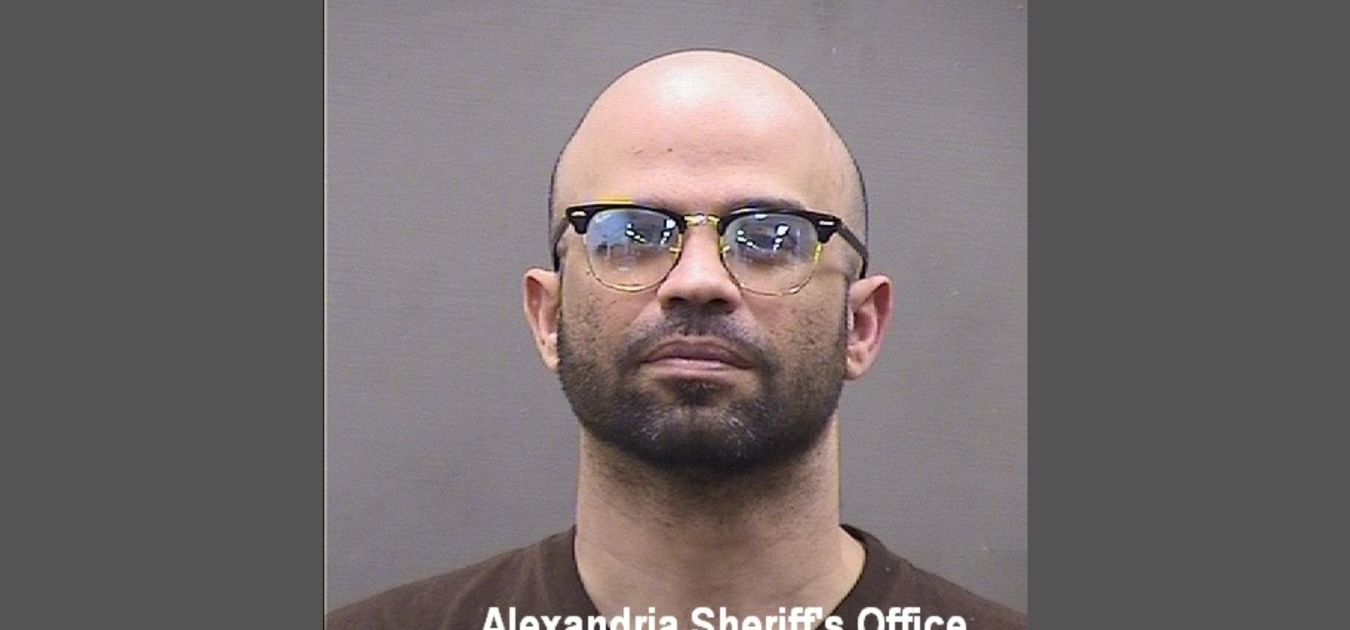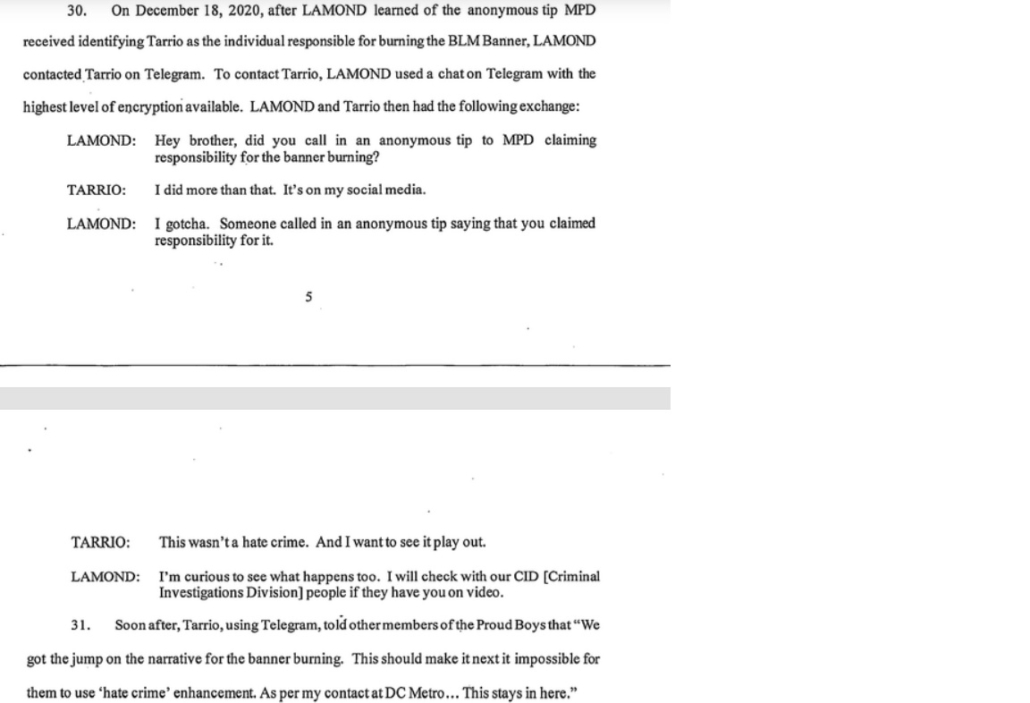Proud Boy Henry Tarrio Sentenced to 22 Years for Role in Jan. 6 Seditious Conspiracy
For his role in leading a seditious conspiracy to stop the peaceful transfer of power on Jan. 6, 2021, the chairman of the Proud Boys Henry “Enrique” Tarrio was sentenced to 22 years in prison on Tuesday.
It is the stiffest sentence yet handed down to any Jan. 6 defendant and among any defendant charged and convicted with seditious conspiracy in relation to the insurrection. While the sentence fell under the 33 years federal prosecutors initially sought, it is also still higher than the sentence given to Oath Keeper founder Elmer Stewart Rhodes. Rhodes received 18 years in May. Matching Rhodes for 18 years is Tarrio’s co-defendant and fellow seditious conspirator, Washington state Proud Boy Ethan Nordean.
Before learning his fate, Tarrio, 38, told the court he regretted his actions on Jan. 6 and that the trial “humbled” him. He apologized to the people of Washington, D.C., and to law enforcement for their suffering.
However, his track record of public and private comments that made it into evidence celebrating the violence of Jan. 6 and specifically, calling to “do it again” in the immediate aftermath, plus his months-long refusal to denounce violence as a means to an end, left U.S. District Judge Tim Kelly unconvinced that anything short of a significant sentence would deter Tarrio or copycats like him in the future.
Federal prosecutor Conor Mulroe urged Kelly on Tuesday to consider Tarrio’s seduction and manipulation of his co-defendants and the thousands of other Proud Boys he held sway over and how slick his “marketing” of the glorification of violence had been.
“Tarrio’s leadership was about violence and manipulation,” Mulroe said. “He demonized his perceived adversaries, glorified use of force, and distributed violent propaganda to thousands and thousands of followers. He elevated street fighting elements with so-called ‘rally boys’ [and] he practiced and endorsed the use of misinformation, plausible deniability, deceiving the public…[and] cultivating fear.”
Tarrio, Mulroe reminded the judge, had compared himself to Nazi propaganda minister Joseph Goebbels for his use of these techniques.
On Jan. 6, Tarrio wasn’t at the Capitol. He was holed up instead at a hotel in Baltimore, Maryland, watching the Proud Boys attack Congress in their vainglorious attempt to ensure the certification was stopped. Tarrio wasn’t in the District of Columbia because he had been arrested just 48 hours earlier and ordered to stay out of Washington, D.C. The arrest was sparked by Tarrio’s theft and burning of a Black Lives Matter banner at a historic Black church after the pro-Trump “Stop the Steal” rally on Dec. 12, 2020. He also visited the White House that morning on what he said was a “public tour.”
When Tarrio arrived in D.C. on Jan. 4, he knew there was a warrant out for his arrest thanks to a tip he received from Metropolitan Police Officer Shane Lamond. At the time, Lamond oversaw the intelligence division at MPD. He and Tarrio had been in contact since at least 2019 and through the 6th, the men had shared at least 500 messages over text. Lamond was indicted this May on a single count of obstruction of justice—for the alleged obstruction of a probe into the burning of the BLM banner—and three counts of making a false statement. He has pleaded not guilty.
Calculating that arrest meant he could inspire his followers and outrage them, prosecutors said. It would generate buzz. It would get a reaction. As Tarrio said on Jan. 4 to Joseph Biggs as he knew he would soon be arrested, “Whatever happens, make it a spectacle.”
The burning of the banner revealed much about who Tarrio was in total, Mulroe argued. Like everything else, Tarrio boasted of his exploits on social media and then marketed off it. At trial, jurors saw footage of dozens of Proud Boys who came to D.C. for the 6th sporting shirts that said: “Enrique Tarrio Did Nothing Wrong.”
“That is the visible manifestation of his influence,” Mulroe said.
When issuing his statement to the court, Tarrio went on a lengthy defense of his actions. He did not testify at trial and for the first time, he stood before the judge to offer his side of things. He believed the election was stolen from Trump in November and his outrage was justified at the time, he said.
Tarrio claimed he told confidantes that he started to doubt whether the election had really been stolen in late November but he was met with “insults and ridicule” so he carried on anyway.
“Even with all my doubts I persisted and attended another rally on Dec. 12,” he said.
And then the same thing occurred the next month when he was spooked by the large size of the Stop the Steal rally that December. He told Judge Kelly, though he admitted to “enjoying the spotlight” he was filled with “dread” after that event.
And yet, he said, he went on anyway and barreled toward Jan. 6.
“Watching the events at the Capitol unfold, I again, chose not to be the voice of reason,” he said.
Kelly would point out to Tarrio and his attorneys multiple times on Tuesday that a sticking point for him in sentencing was Tarrio’s commentary in public and private before, during, and after the 6th that chilled him. Tarrio told Proud Boys he was proud of them as they attacked the building. When a fellow Proud Boy asked Tarrio what to do next, Tarrio responded: “do it again.”
“I believe I made these statements to appease them, ” Tarrio said in a comment most uncharacteristic of the uncompromising alpha-male Proud Boys philosophy.
As for the terrorism enhancements around his sentence, Kelly explained that while they technically applied, he drew a distinction. He didn’t think Tarrio or his co-defendants had intent to kill or that they were engaged in the more typical terrorist conduct of blowing up a building or targeting U.S. troops.
“I am not a political zealot,” Tarrio said, adding that “inflicting harm or changing the outcome” was not his goal.
“Please show me mercy,” he added. “I ask you not to take my 40s from me.”
Nonetheless, the prosecutors argued that Proud Boys may not have strapped a bomb to their chests or signed up for training camps but they were “thrilled by the notion of traveling from city to city and beating their adversaries senseless in a street fight.”
The Proud Boys weren’t a “drop in the bucket” of violence on Jan. 6 Mulroe said.
They were the “tidal wave” that broke through the first barriers and it was Proud Boys who were in huge numbers in the first wave of rioters who streamed past police and into the Capitol. There were at least 200 Proud Boys present on the 6th, called in from all over by chapter leaders and urged on by Tarrio’s position as figurehead.
Before imposing the sentence, Kelly told him, it was “revolutionary zeal” that anchored the conspiracy and resulted in those 200 men getting “amped up for battle [and] encircling the Capitol.”
Members of Tarrio’s family, including his sister, mother, and fiancee, spoke on his behalf and pleaded with Kelly for mercy. The judge acknowledged the support the now-defunct leader had but in his own remarks, he showed no remorse for his crimes.
Telling him that his absence from the Capitol on the 6th actually did serve a strategic purpose for his lieutenants Nordean, Biggs and Rehl to rile up the crowd, Judge Kelly said it wasn’t lost on him that Tarrio even in his statement Tuesday, was trying to “insulate” himself and “distance” himself from what in fact unfolded that day.
“That’s useful to someone as smart as Mr. Tarrio and then, before the day was out, putting publicly on social media, ‘I’m proud of boys and my country’ and ‘don’t fucking leave,” Kelly said before repeating it. “Don’t fucking leave.”
Kelly said he couldn’t say for certain “how close” things came on Jan. 6 to the nation not actually completing its transfer of power but he maintained that what happened was serious and a “disgrace.”
“And I have Mr. Tarrio publicly putting out there, ‘don’t fucking leave’ and privately, to another confidante, ‘make no mistake, we did this,'” Kelly reiterated.
Then, seemingly aghast at Tarrio’s brazenness, the judge repeated each word methodically: “‘Make no mistake, we did this.”
The judge also noted how Tarrio put into yet another message that if “God didn’t put me there [at the Capitol on Jan. 6] for a reason, we would still be there.”
“I don’t have any indication that he is remorseful for the actual things he was convicted of which is seditious conspiracy and conspiracy to obstruct the election,” Kelly said.
After the sentencing was over, Tarrio walked out and threw up a peace or victory sign.
His attorneys told CNN after the hearing that they were “caught off guard.”
“That’s what the appellate process is for,” he said.
To take a look through my live feed of proceedings posted to Twitter, a link is available here.

